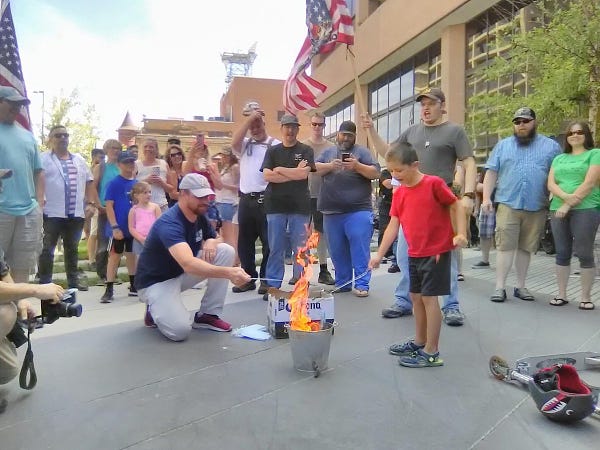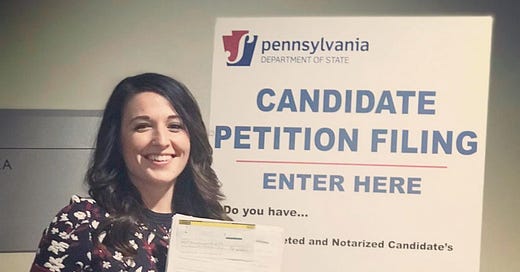Pennsylvania’s COVID-spreading legislator has an inspiring opponent
Another side to the story that made headlines in May
Welcome to the big Sunday edition of Progressives Everywhere! This week, we’re going deep on:
A tight Pennsylvania campaign against an infamous COVID patient zero
Marijuana legalization and healthcare reform in new states
The ongoing battle for democracy in Georgia
Bail reform news
This Flippable Race in Pennsylvania is Personal
On May 27th, Pennsylvania State Rep. Andrew Lewis (HD-105) publicly announced that he had been diagnosed with COVID-19… on May 18th. While Lewis told his GOP colleagues about his illness, the press release was the first time Democrats who serve at the State House were informed that their colleague may have exposed them to the extremely contagious, extremely deadly virus.
That brazen display of deadly selfishness should tell you all you need to know about Lewis, who has spent most of the pandemic fighting to reopen Pennsylvania’s construction sites so that his family’s non-union construction business can resume work. Just about any Democrat would be better than Lewis, who won by just 500 votes in 2018, and his opponent in this November’s election, Brittney Rodas, is far more than just any run-of-the-mill Democrat.
Just 25-years-old, Rodas has a deep understanding of the government’s complex inner-workings. She worked as a policy analyst in the state legislature beginning in college, working with fellow Democrats to meet with constituents and draft new rules and laws that touched the everyday lives of people across the state. What inspired her to run in this very swingy Harrisburg-area district, however, was the death of her father, a former steelworker and Vietnam veteran. With his passing, Rodas experienced first-hand the very real consequences constituents face when the state falls short of its promises.
“My dad died in July last year after he struggled for a lot of his life with health care,” Rodas tells Progressives Everywhere. “And a lot of those struggles were because of his time in the service. He had COPD and all these other underlying issues. So I had been fighting for insurance for him through [government programs]. Ultimately, he made $7 over the Medicaid limit, which meant he couldn't afford prescription drugs. When he died, I felt like the system had failed him and I had spent all of my time working for this system.”

As a Democratic aide in a state gerrymandered by Republicans, the countless hours Rodas spent crafting policy often went for naught, with important reforms and new laws meant to help people consistently blocked by the GOP majority.
“I got to a point where I was like, I can't go back and work for this institution if this is the outcome,” she says. “It weighed on me a lot, but I came to a point where I had to either sit and grieve and not have anything positive come out of this horrible situation or try to make something better for somebody else.”
CLICK HERE to donate to Brittney Rodas’s campaign via Progressives Everywhere’s ActBlue page!
Understandably, much of Rodas’s focus is on expanding access to healthcare and ensuring that Pennsylvanians are safe both during the pandemic and after it ends. Inherent in that is an emphasis on keeping the air and local rivers clean, which can be tricky in a district where steelwork is a legacy and fracking is a huge issue that can split the normal progressive alliance between activists and union leaders. As the daughter of a steelworker, Rodas understands the feeling of urgency, but has remained steadfast in her beliefs instead of going along to get along with local business leaders.
“I'm running on my morals and my values, and I'm not going to curb that for a check for my campaign,” she says. “I’ve studied what fracking does, primarily to black and brown communities. I think that unions are a little bit frustrated with Democrats in general because of their stance on some of these issues. But we really know that if we would reinvest that money into green infrastructure, we wouldn't be losing jobs and bringing jobs and improving our air quality.”
Fighting fracking is high up on her list because she knows that the long-term impacts on children who grow up with poisoned air and water are devastating. With two small children at home, the issue is personal for her, as is the fight over education happening in the state.
Charter schools have long eaten up much of the education budget in the state, leaving public schools underfunded and struggling. Democratic Gov. Tom Wolf has called for changes to the formula, but it’s unlikely to happen without a Democratic majority.
That goal is no longer out of reach thanks to blue gains in 2018 and 2019. Democrats now need just four State Senate seats and nine House seats to flip the entire state, and District 105 is one of their juiciest targets. The district is filled with the sort of educated voters who have been moving left in recent years and will be motivated to turn out at the ballot box this year. Road’s work to turn the district blue will only help in the fight to defeat Donald Trump in Pennsylvania, a state Democrats absolutely must win.
CLICK HERE to donate to Brittney Rodas’s campaign via Progressives Everywhere’s ActBlue page!

Important News Roundup
Here are some of the big headlines you may have missed over the long weekend.
If you want the most crucial down-ballot and progressive activist news directly in your inbox every night of the week, you can subscribe to the premium edition of the newsletter!
Marijuana legalization and healthcare on the ballot
Last week, voters in Oklahoma vote to enact a constitutional amendment that expanded the state’s Medicaid program, continuing the trend of red state activists circumventing legislators to enacted popular policy. Next up are Nebraska and Arizona, where petitions to get an initiative on the ballot were due this past Thursday.
In Nebraska, activists turned in over 180,000 signatures in support of putting medical marijuana legalization on the ballot this November. With 60,000 signatures more than the legal requirement, they should have no problem standing up to the usual Board of Elections scrutiny. The campaign was led by State Sen. Anna Wishart and State Sen. Adam Morfeld.
Meanwhile, in Arizona, activists handed in petitions with about 420,000 (heh) signatures in support of putting recreational marijuana on the ballot. That far eclipses the 237,000 signatures required, a strong showing for a campaign that fell just four points shy of success back in 2016. Republicans have been total killjoys and refused to even consider legislation that would legalize weed, but maybe they’ll be enticed by the proposed 16% sales tax, which proponents say could raise $300 million a year.
Arizonans will actually have a lot to consider this November (good thing they’ve seemingly made up their minds about their US Senate race). Both healthcare and criminal justice reform are on the ballot, thanks to very strong signature-gathering campaigns amidst the pandemic.
The healthcare initiative seeks to:
End the “surprise billing” that patients are often hit with by out-of-network doctors working in hospitals;
Guarantee coverage for pre-existing conditions in the event that Obamacare gets dismantled;
Increase hospital workers’ pay by 20% over four years;
Require hospitals to meet national standards for infection control (which doesn’t seem like a lot to ask).
On the criminal justice side, the Second Chances, Rehabilitation and Public Safety Act seeks to undo some of the harsh mandatory minimums and bar legal tricks that prosecutors often use to get longer sentences.
It would empower judges to deviate “in the interest of justice” in what are defined as “non-dangerous” offenses, even to the point of suspending sentences and placing people on probation. And they could consider input from victims, family members and experts, and other factors related to the circumstances of the case.
It would also allow inmates sentenced for non-dangerous offenses to be released after serving 50 percent of their time. Now the minimum is 85 percent.
It would end the practice of some prosecutors of “stacking” charges in a way that allows someone to be sentenced as a repeat offender even if they have no prior convictions.
Look at these selfish dingleberries


Georgia, still not into democracy
It’s hard to overstate just how much Georgia Gov. Brian Kemp and his fellow Republicans hate the idea of representative democracy. They gerrymandered their way into a legislative majority, purged enough voters and shut down enough polling sites to steal the 2018 election, and after totally boofing the June primary, they’re making absentee voting much harder. But wait, that’s not all!
In 2018, Kemp deliberately slow-walked the nomination of a district attorney so that they wouldn’t have to face an election until 2022. It was a bit of anti-democratic bureaucratic chicanery, and thankfully, a federal judge has called him out on it, and there may be an election for the position this November after all. That in and of itself is important, but as the Atlanta Journal Constitution notes, it may have important implications for a state Supreme Court election that Kemp is also trying to deprive voters a say in, as well.
Defund the Politicians Funded by Police
In the fall of 2019, after real Democrats took back control of the legislature, New York passed a much-needed criminal justice reform law that eliminated cash bail for misdemeanors and non-violent crimes and slashed the wait time between arrest and trial. It went into effect in January and had an immediate positive impact. According to a report by Citizen Action NY, “the law led to a 30% reduction in the average daily jail census statewide—from 21,406 a year ago to 14,983 in January 2020. Each day in February 2020, 6,800 fewer New Yorkers were jailed pretrial than in February 2019.”
From the moment the law passed, though, New York’s powerful police unions, real estate lobby, prosecutors, and suburban racists were on the offensive, working overtime to have the legislation repealed. And unfortunately, even with a more progressive legislature, the positive results from the law, and the deadly outbreak of coronavirus in Rikers and other prisons, enough New York Democrats succumbed to the pressure and voted to roll parts of the law back.
Those rollbacks went to effect on Thursday, even as COVID-19 continues to plague the nation and the backlash against police continues to inspire protests across the city. The legislature did pass some overdue criminal justice reforms in June — the bare minimum, largely bills that had been sitting around for months and months — but what’s clear from both these rollbacks and the failure to cut the NYPD budget last week is that activists are still facing an uphill battle.
This, via Citizen Action NY, makes clear what we’re up against:

Public opinion is quickly moving in favor of enacting serious changes to our overpoliced carceral state, but money always talks, which means we need to shame Democrats out of taking donations from police unions. The movement to do just that is already in progress.
A note about our crowdfunding campaign: Progressives Everywhere will always be a free newsletter. Together we've raised over $1 million for progressives candidates and causes and over $1.5 million for bail funds and grassroots community groups! We’ve grown so much that it costs $100 just to send this email, and there are other costs as well.
We’re now sending out daily news editions of the newsletter, filled with important news, undercovered stories, electoral analysis, and everything else you need to stay ahead of the curve in this intense time. It costs just $5 a month.
To help support the cause, you can also make donations at GoFundMe (you’ll be thanked in future public editions of the newsletter).



